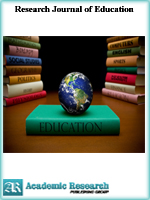Research Journal of Education
Online ISSN: 2413-0540
Print ISSN: 2413-8886
Print ISSN: 2413-8886
Quarterly Published (4 Issues Per Year)

Archives
Volume 5 Number 5 May 2019
Challenges in Teaching English to Young Learners at Primary Stage: A Case Study of the Primary Schools in the State of Kuwait
Authors: Hussain Al-Ali ; Katy Mann
Pages: 69-77
DOI: doi.org/10.32861/rje.55.69.77
Abstract
The aim of this research paper is to identify the perceptions of teachers of the English language about the main challenges in teaching primary stage pupils and to recognize the challenges that are experienced locally in the five educational areas available in the state of Kuwait. Both qualitative and quantitative methods have been applied because data were supposed to be in the form of numbers. The survey was provided by a hard copy to about (20) teachers of English language in the state of Kuwait. The survey itself consisted of two sections. The first section referred to some sort of a ranking question. That means the teachers ordered the factors that might develop teaching English to young learners according to their point of views. The second section of the survey included an open question as follows: Which aspect do you think the most challenging in teaching young pupils and why? The results revealed that teachers of English are challenged by several factors including lack of training, resources, and knowledge. Most teachers suffered from lack of time to teach; particularly, teaching writing and grammar.
Improvisation of Teacher-Made Instructional Media and Students’ Performance in Primary Science in Nigerian Schools
Authors: Udosen Idongesit N. ; Ekukinam Thelma U.
Pages: 63-68
DOI: doi.org/10.32861/rje.55.63.68
Abstract
The study examines the effect of improvisation of teacher-made instructional media on students’ performance in some selected primary science concepts. Thus, a pre-test and post-test, non-randomized experimental design was adopted for the study. Three thousand, three hundred and sixty-eight (3,368) primary six pupils from 48 public primary schools in Akwa Ibom State formed the population while two hundred and nineteen primary six pupils from two schools formed the sample for the study. The two intact classes were exposed to standard and improvised science equipment. A Primary Science Performance Test (PSPT) instrument was used to collect data before and after each lesson. A t-test statistical analysis revealed that there is no significant difference of the post-test performance of intact classes exposed to improvised science equipment and those standard equipment indicating that pupils benefited equally from the standardized and improvised equipment with t-calculated score of 1.34 below the t-critical 2.92. It is recommended that the government should organize workshop on the use of improvised materials to change the orientation of the teacher centred instructional approach to teaching primary science.



